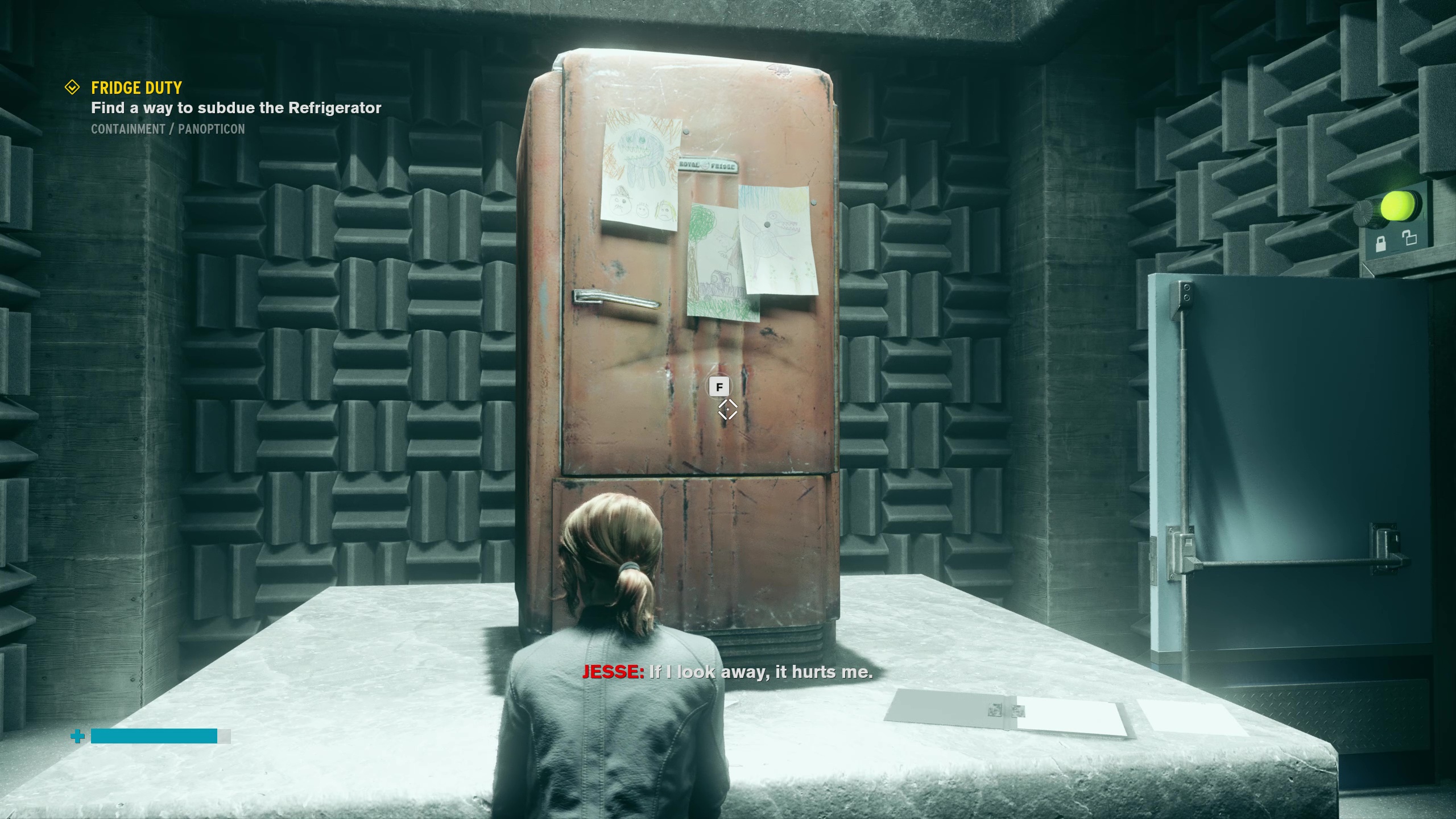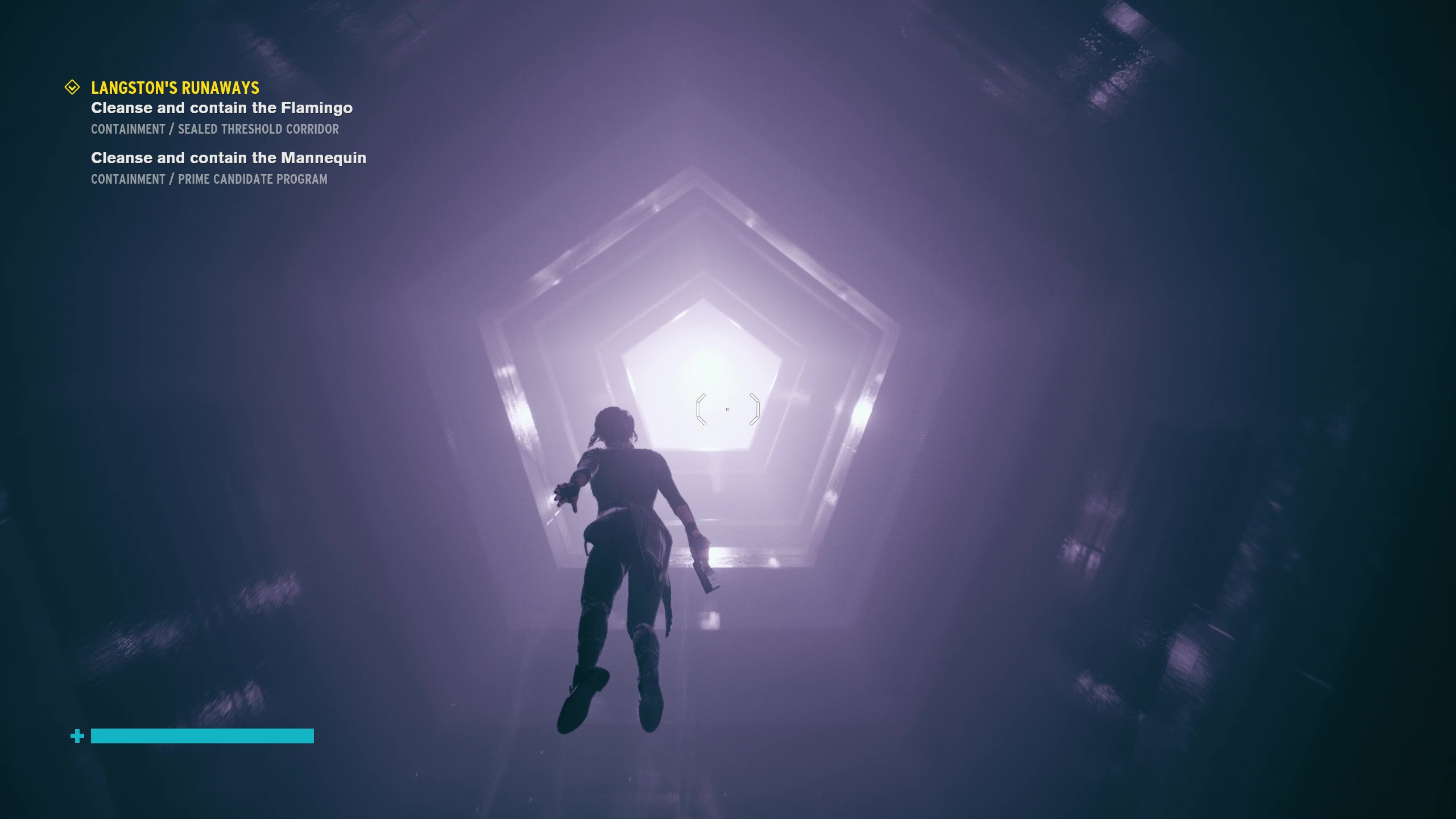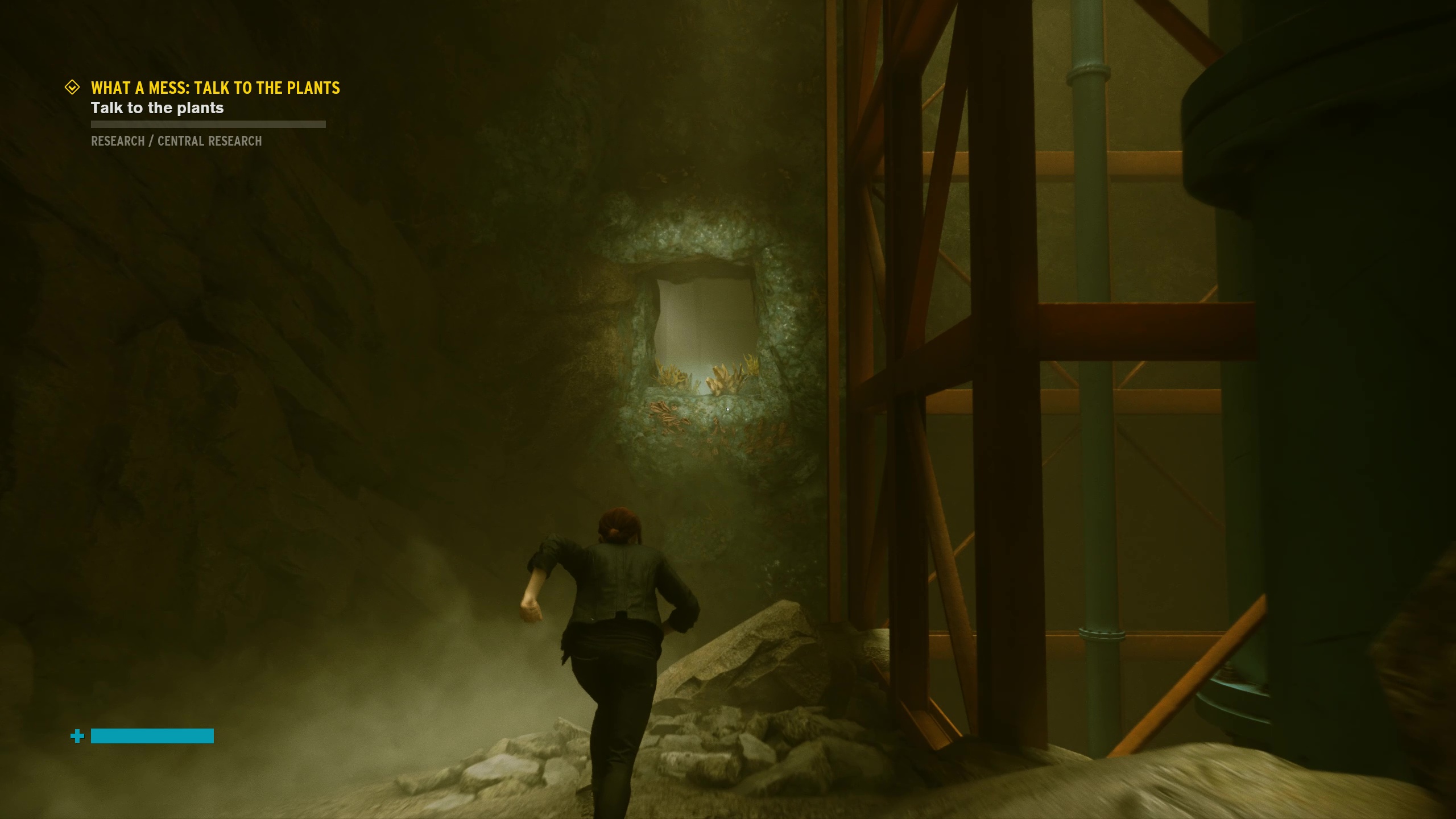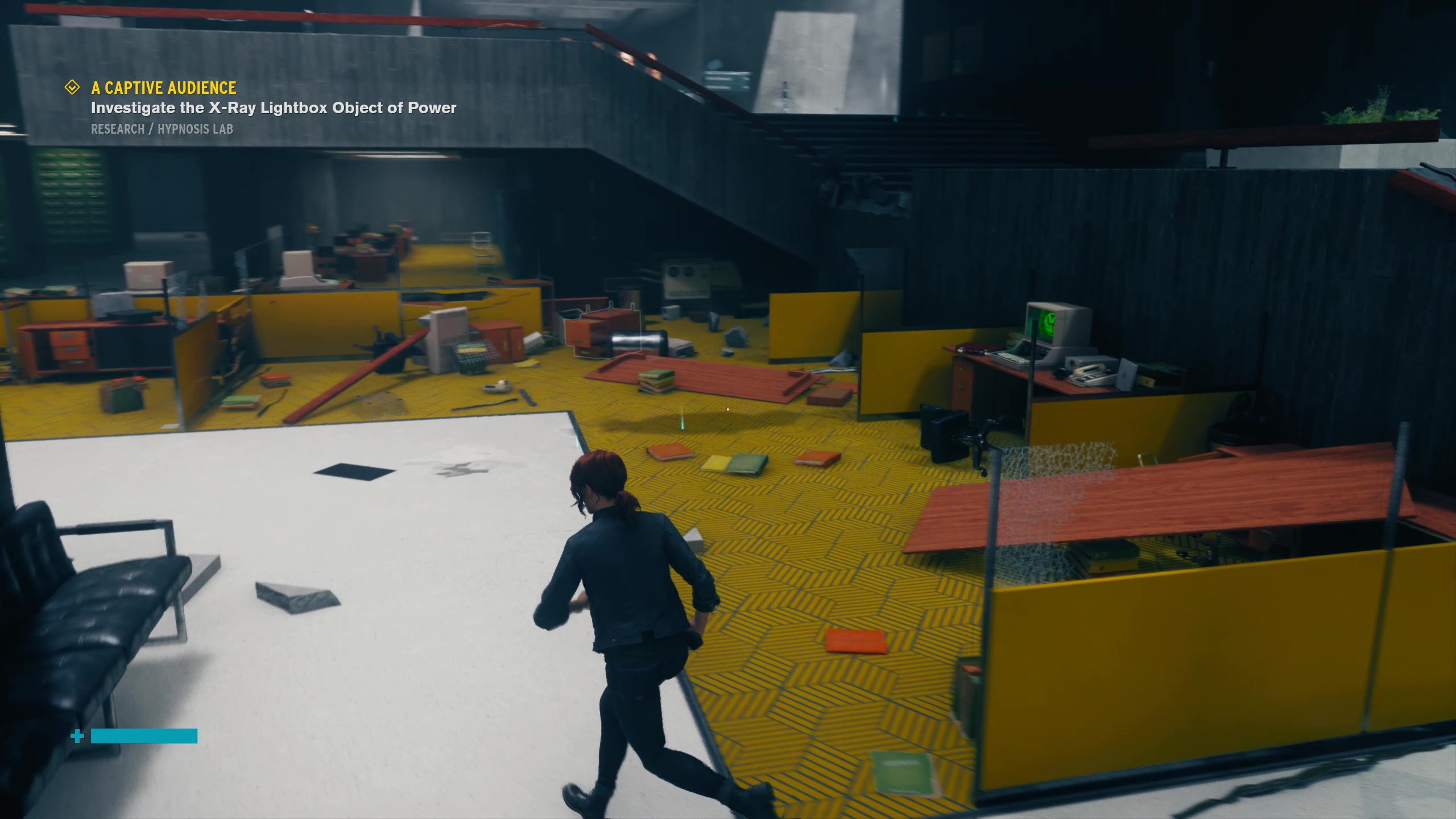Our Verdict
Control's thin protagonist and abrupt ending are propped up by an abundance of mystery, wonder, and glorious room-destroying combat.
PC Gamer's got your back
What is it? A third-person shooter set in a paranormal funhouse.
Expect to pay: $60
Developer: Remedy Entertainment
Publisher: 505 Games
Reviewed on: RTX 2080, i9-9900k, 32 GB RAM, SSD
Multiplayer? None
Link: www.controlgame.com
"You need to deal with that shit."
The omnipotent Finnish janitor of the Federal Bureau of Control really wants to go on vacation, but can't until I've vanquished his old nemesis, The Clog. In what we'll call the 'bottom' of The Oldest House, an impossible building in the middle of New York that's infinitely larger on the inside than the outside, The Clog takes up residence near the coolant pumps, a swirling mass of brown slop that moans like a T-rex roaring bubbles into a glass of milk.
I shoot the wriggling maggot-like tendrils peeking out of the body and the hulking shit monster dissolves and disappears down the drain to the tune of a toilet flushing. It's never explained, but I like it that way. Clock in, kill a poop monster, clock out, no questions asked. Keeps the mystery alive.
Control is an acrobatic third-person shooter set in an amorphous concrete dimension infested by the sanitized office culture of a 1960s-era government bureaucracy. Aside from a poo beast, you'll discover new powers and revisit areas of The Oldest House to find upgrades, secrets, and side missions, all while throwing bullets and random objects at bad guys in Remedy's best combat system yet.
Remedy's taking a harder thwack at weird fiction than ever before, too. Despite a few weak characters and plot threads, the team succeeds. In Control, every conspiracy theory, ghost encounter, and alien abduction happened, just not quite for the reasons you'd expect. It's a collection of stories about seeing through the banality of everyday life, a story about language, mass media, and statecraft delivered with a dry sense of humor and no tether to reason. I still don't understand it. I don't need to. Bless this mess.
Semantics
A floppy disk hurls debris and office supplies at my head. A fridge levels buildings unless someone looks at it 24/7.
I ran Control on the highest settings at 2560x1440 and maintained 60-90 fps depending on the complexity of the scene, but my PC is fairly juiced, so it's not the best reference point. Our complete Control performance analysis covers tons of graphics card options, with ray tracing and DLSS benchmarks as well.
Jesse Faden shows up to the The Oldest House with mysterious motives, and through bizarre circumstances that also make no sense (at first), she's suddenly thrust into the role of Director of the FBC. An Object of Power, a gun called The Service Weapon, chooses her, granting her the ability to wield the weapon and traverse The Oldest House without worry that The Hiss, another unexplainable entity that's invaded the FBC and has been turning its employees into glowing red monsters, will infect her mind. Control's a doozy.
I spent most of the first hours reeling with confusion, writing down acronyms and pausing to let moments sink in before moving on. Control's narrative is outright inaccessible at first, but that's exactly what Remedy is going for. I still don't know what The Hiss are, why The Service Weapon chose Jesse, why everyone's cool with taking orders from a transdimensional 'Board' that speaks in mumbles emanating from an inverted triangle and whose speech translates into multiple, parallel sentences at once. It/They are/is confusing/unknowable and that's OK/acceptable/true.
Keep up to date with the most important stories and the best deals, as picked by the PC Gamer team.
Inanimate objects are imbued with godlike powers, the product of Altered World Events or strange phenomena that make up modern American folklore. The FBC visits these places and collects these objects for study in The Oldest House, the panopticon and petri dish they call home.
A floppy disk hurls debris and office supplies at my head. A fridge levels buildings unless someone looks at it 24/7. I accidentally let a rubber duck loose that harasses me, barking like a demonic dog from the corner of every room I enter. Control is littered with mundane objects made fascinating and sinister, treating Jungian ideas of the collective subconscious and a touch of Baudrillard's hyperreality as the foundation for its paranormal logic. Folklore and language are the literal authors of truth. Finally, mainstream sci-fi that isn't spaceships and militarism and hot green men (love you, Thane).
Jesse's story is similarly cryptic and weird, but compromised by a vapid personality and weak connections to the supporting cast. She's harboring her own mystery, one closely tied to a family life she even keeps secret from the player for some time, but her sheepish concealments keep her at a distance, while her commentary too often mirrors my own. What the hell is happening, did that stapler talk to me, ad infinitum.
We're both baffled by the logic and hidden truths of the FBC and Oldest House, but those moments aren't used to give Jesse a moment to reveal who she is. Her personality never quite coalesces, though the manifold mysteries of the FBC told through confidential documents, audio logs, and FMVs do well to buoy the lack of character.
A lightswitch in a Butte, Montana bungalow teleports the user to an oceanside hotel somewhere in time and space, a sort of dimensional transit station. Altered Item case files tell stories about a picnic basket that attracts woodland creatures or a surfboard that gives anyone touching it an excess of confidence. Then there's a creepy puppet TV show the bleach-brained FBC put together to introduce kids to their research, replete with lingering gazes at the camera and sinister voicework. It's horrible! I love it.
The Oldest House is a fascinating setting, but Jesse's family story about shared trauma and the effects of living in a media driven world doesn't say much beyond how disorienting it is.
Control is best when it uses these heady concepts about language and reality as the basis for a set of wild stories. But it ends—after a wild head trip of a sequence, of course—a little too abruptly, like it had just tee'd up those big ideas but forgot to swing. The arc doesn't feel complete or entirely fulfilling, as much fun as the ride is, though it's clearly setting up for a sequel, spinoff, or DLC somewhere in the Remedy-verse. Bring it on.
Yes, there are guns
OK, so why is a coral reef growing out of the wall in the maintenance sector, and why does Jesse think it smells delicious? I don't know if I'm meant to reach the high ledge where I see the ocean floor growing quite yet, but I try anyway.
I round the corner and clamber up some rocks where I chain Jesse's dash ability through the air and back around the corner, where I manage to hit the wall below the ledge at just the right point. She grabs it and pulls herself up. I find enemies too powerful for my low-grade abilities and guns, so I dip out. But now I have a new mystery to solve and a good reason to shoot some Hiss for upgrade points and currency to make new astral constructs (guns).
Control's shooting may be the last thing anyone will talk about after the credits roll—like I said, there's a rubber duck that harasses you—but it's Remedy's best yet.
Enemies drop health where they die and Jesse is so fragile that I have to constantly push the enemy position to stay alive, Doom 2016 style. It's propped up by smart interplay between the weapon system and extremely satisfying telekinetic abilities.
Jesse's telekinesis joins Half-Life 2's juiced gravity gun in the videogame physics toy hall of fame.
The Service Weapon morphs between two forms of your choosing, each representing a fairly standard videogame gun archetype: pistol, shotgun, SMG, sniper, and grenade launcher. Ammo isn't a thing though, as 'magazines' are represented by energy. Empty the weapon and it'll recharge after a few seconds, a nice bit of encouragement to reposition or, better, use a telekinetic ability, which have their own recharging energy bar.
It's energy bar ping-pong: shoot, use an ability, shoot, use an ability. In detail: I headshot a soldier with Shatter, leap into the air, dash up to the second floor, throw an industrial copier at the shielded guy at the back of the room, wing a few pistol shots at someone dashing between cover, summon the rubble and objects around me as a shield to take on the incoming rocket, drop the shield and grab the next rocket with telekinesis and fling into the next unlucky Hiss soldier. This one's strapped to a chair and floating around in the sky, a fellow telekinesis user. With their health low, I use mind control to turn them to my side. Telekinetic buds, tossing file cabinets around. Good times.
With a complete arsenal of abilities, I'm able to bounce around the big, multi-tiered arenas like Superman with a handgun permit. But before I found the dash and shield abilities, and before I finished enough missions to upgrade my health and energy reserves, I was too often pinned to a corner and easily overwhelmed. It doesn't take terribly long to get up to snuff, but early combat encounters are frustrating compared to what follows.
When you're fully powered-up, Remedy's love of flying objects comes to the fore. The Oldest House's tidy environments are like water. Every dash sends papers flying, coffee cups crashing. Jesse can toss any object in the environment with her brain, turning banal office spaces and retro futurist underground labs into disaster areas. Levitating pulls errant objects into Jesse's orbit, like lazy little moons: staplers, rubble, pencils, printers, corpses. Max Payne would be proud.
Control is a top-tier mess-making simulator. Jesse's telekinesis joins Half-Life 2's juiced gravity gun in the videogame physics toy hall of fame.
But, like the story, the momentum peters out right when things come together. Chasing every skill upgrade through endgame sidequests (the credits aren't the end-end) too often climax in boss fights that are conceptually interesting but aren't fun to fight.
The upgrades are too simple to feel worth chasing anyway, largely linear improvements to health, energy reserves, damage from thrown objects, how many enemies you can mind control at once, and so on. Given how playful the combat already is, I would've loved to see some comparably playful deviations in the skill tree. As it stands, it's just killing stuff to do what you already do more efficiently. Feels great, but doesn't change much.
My second full lap of The Oldest House is still unearthing new discoveries, entire wings I missed at first, more Altered Items playing clever tricks, hidden bosses, secret areas, and, best of all, [REDACTED]. Control's combat is slow to start and its overarching story doesn't go far enough, but it's a gorgeous font of wonders and poop monsters and wild physics unlike anything I've played in recent memory.
Control's thin protagonist and abrupt ending are propped up by an abundance of mystery, wonder, and glorious room-destroying combat.
James is stuck in an endless loop, playing the Dark Souls games on repeat until Elden Ring and Silksong set him free. He's a truffle pig for indie horror and weird FPS games too, seeking out games that actively hurt to play. Otherwise he's wandering Austin, identifying mushrooms and doodling grackles.







